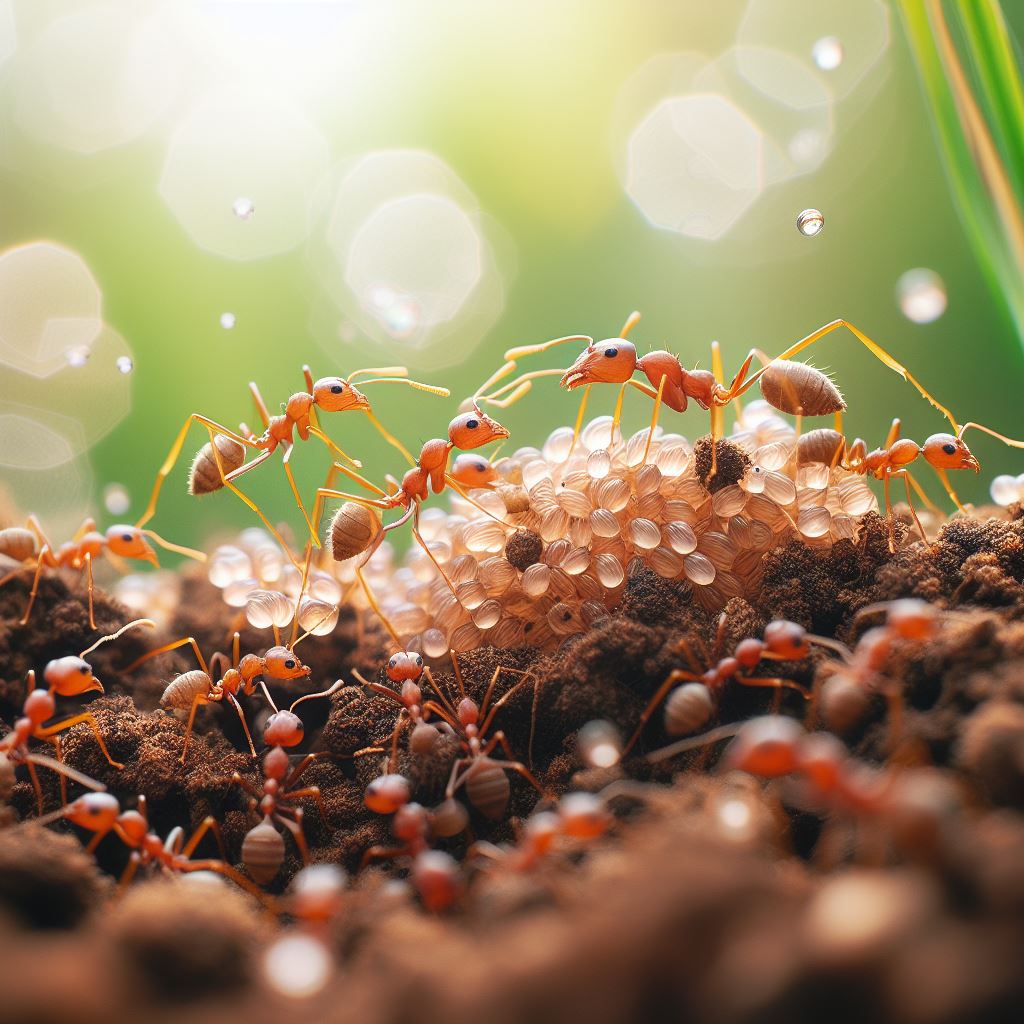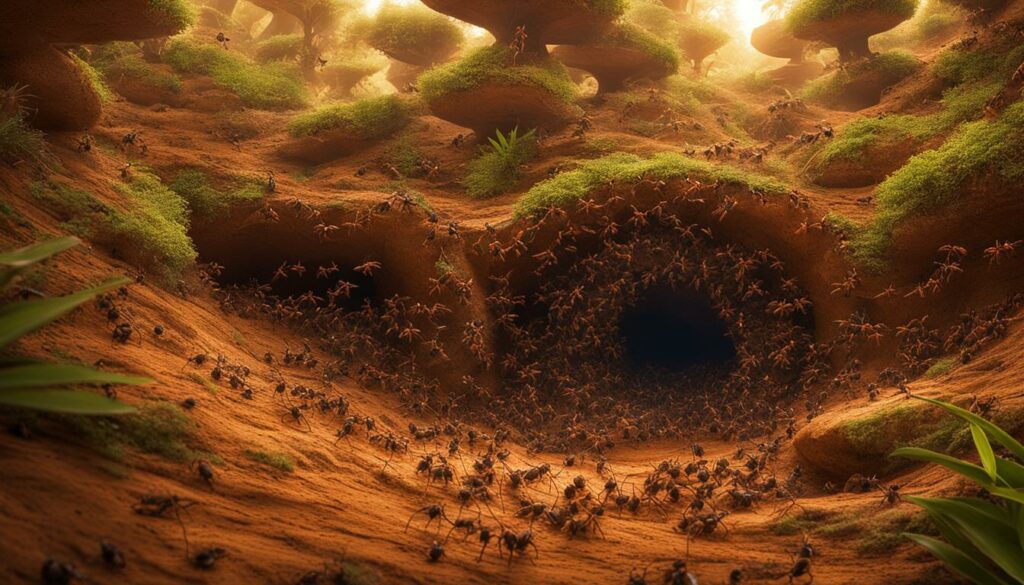Ants, those industrious creatures that scurry about tirelessly, have always fascinated us with their complex societies and intricate behaviors. One intriguing aspect of ant life is their lifespan. Have you ever wondered how long do ants live? In this article, we delve into the fascinating world of ant lifespans, exploring the factors that influence their longevity and uncovering some surprising insights from scientific research.
Key Takeaways
- Ant lifespan varies depending on various factors such as species and caste within the colony.
- The queen ant can live for several decades, while other ants have shorter lifespans determined by their roles and species.
- Factors like resources, location, and outside influences can also impact an ant’s lifespan.
- Research has revealed the role of insulin signaling, protein regulation, and parasites in ant longevity.
- Understanding ant lifespans opens up possibilities for studying longevity in other species.

Factors Affecting Ant Lifespan
Several factors can influence the lifespan of ants. Let’s explore the key factors that contribute to variations in ant lifespan:
1. Ant Species
The species of ant plays a significant role in determining their lifespan. Different ant species have distinct longevity patterns, with some living much longer than others. This variation is attributed to genetic differences and adaptations specific to each species.
2. Ant Gender
Ant gender also affects lifespan. Male ants, known as drones, have shorter lifespans compared to female ants. Drones’ sole purpose is to mate with queen ants before dying, while female ants, including workers and queen ants, have longer lifespans.
3. Ant Caste
The ant caste, determined by genetics and the care provided during development, also influences lifespan. Workers, which make up the majority of the colony, have variable lifespans ranging from a few months to a few years. Soldiers, responsible for defending the colony, generally have shorter lifespans. Alates, reproductive females, have a lifespan that includes the time spent developing and swarming before settling to create a new colony. The queen ant, responsible for egg-laying and colony survival, typically lives the longest.
4. Available Resources
The availability of resources, such as food and shelter, also plays a role in ant lifespan. A colony with access to abundant resources is more likely to have ants with longer lifespans as they can meet their physiological needs more effectively.
5. Location
The geographical location of an ant colony can impact its lifespan. Environmental factors like climate, temperature, and humidity can influence the longevity of ants. For example, ants living in harsher climates may have shorter lifespans due to increased stress and limited resources.
6. Outside Forces
External factors such as predation, competition, and exposure to pesticides or other hazards can also affect an ant’s lifespan. These outside forces can directly impact the survival and average lifespan of ants within a colony.
7. Summary:
| Factor | Description |
|---|---|
| Ant Species | Different ant species have varying lifespans. |
| Ant Gender | Male ants generally have shorter lifespans compared to female ants. |
| Ant Caste | The caste of an ant, determined by genetics and care during development, affects lifespan. |
| Available Resources | The abundance or scarcity of resources can influence ant lifespan. |
| Location | Geographical factors can impact the lifespan of ants. |
| Outside Forces | External factors like predation and competition can affect ant lifespan. |
Insights into Ant Lifespan from Research
Recent research on ant lifespan has provided valuable insights into the factors that influence the life expectancy of these fascinating creatures. One significant finding is the role of insulin signaling in ant lifespan. Studies have shown that changes in how ants respond to insulin can impact the evolution of reproductive and nonreproductive castes within ant colonies. This discovery showcases the intricate relationship between hormonal signaling and the division of labor in ant societies.
Another area of research that sheds light on ant lifespan is protein regulation. Specifically, scientists have found that certain proteins play a crucial role in prolonging the lifespan of ant queens. These proteins safeguard the queen’s metabolic processes and inhibit aging pathways, contributing to their longer lifespans compared to other castes in the colony. This finding highlights the importance of protein regulation in understanding the aging process not only in ants but potentially in other species as well.
Intriguingly, researchers have also uncovered the impact of parasites on ant lifespan. A study revealed that a parasitic tapeworm has the ability to extend the lives of infected ants. The tapeworm secretes compounds that act as antioxidants, which neutralize harmful free radicals and reduce oxidative stress in the ant’s body. This unexpected discovery underscores the complexity of the interactions between parasites and their hosts, providing new perspectives on the lifespan of ants and potentially other organisms.
The accumulation of research in these areas highlights the intricate mechanisms that underlie ant lifespan. Understanding the role of insulin signaling, protein regulation, and even parasite interactions can offer valuable insights not only into the lifespan of ants but also into the broader context of longevity in different species. The findings from these studies open up new avenues of exploration and deepen our understanding of the fascinating world of ant biology and beyond.

FAQ
How long do ants live?
The lifespan of ants varies depending on factors such as species and caste within the colony.
What is the average lifespan of ants?
Ant lifespan can range from a few months to several years, depending on the ant’s role and species.
Do different ant species have different lifespans?
Yes, the lifespan of ants can vary greatly between different species.
What is the lifespan of worker ants?
Worker ants, which make up the majority of the colony, typically live for a few months to a few years.
How long do queen ants live?
Queen ants can live for several decades, with the oldest known queen surviving over 20 years.
What factors can affect an ant’s lifespan?
Ant lifespan can be influenced by factors such as ant species, gender, caste, available resources, location, and outside forces.
Does ant gender impact lifespan?
Yes, male ants typically live shorter lives as their sole purpose is to fertilize queen ants before dying.
How does ant caste affect lifespan?
Ant caste, determined by genetics and the care provided during development, can influence lifespan. Workers, soldiers, and alates have different lifespans based on their roles within the colony.
Is there any research on ant lifespan?
Yes, recent research has provided insights into the factors that affect ant lifespan, including insulin signaling, protein regulation, and the impact of parasites on ant lifespan.